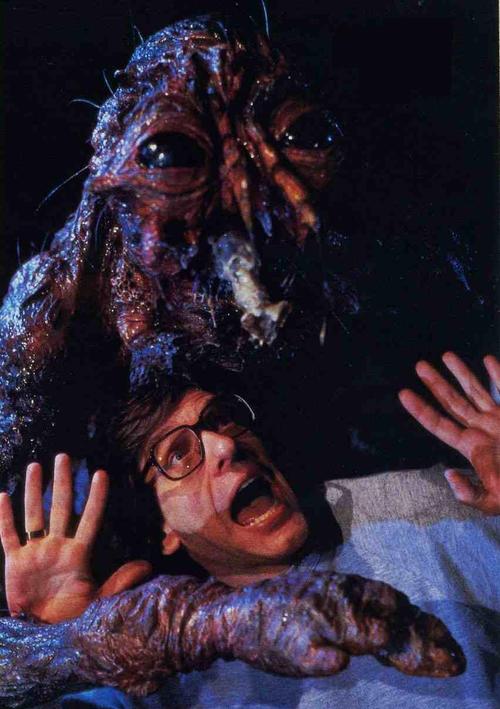
Many of us are fans of horror, but few of us get to be a part of horror history. Even fewer get to make horror history. Emma Westwood is someone who dances between those two worlds, simultaneously participating in and creating with her upcoming book about David Cronenberg’s THE FLY. The film is one of the best in horror, and a rare remake that manages to make most people forget the original existed (see also John Carpenter’s THE THING and Brian De Palma’s SCARFACE). An interesting sidenote for those three is that their originals were adaptations of literature: George Langelaan’s The Fly, John W. Campbell Jr.’s Who Goes There?, and Armitage Trail’s Scarface, respectively.
Ms. Westwood hails from Australia (that’s Mad Max, not Middle-earth) and carved out enough time for Daily Grindhouse to answer a few questions about Cronenberg and her upcoming book. Her first tome, Monster Movies, is detailed look at a selection of horror movies and directors. She can be found on Twitter, @EmmaJWestwood, and talking about movies past and present with others on the weekly podcast, Plato’s Cave. Ask her about Dario Argento sometime.
Thanks again to Ms. Westwood for her time and awesome replies.
Daily Grindhouse: What do David Cronenberg and THE FLY mean to you?
Emma Westwood: THE FLY was released when I was just a kid so I wasn’t meant to see it at the cinema – the rating precluded me – but somehow I did. Twice. It came out at a time when I was getting really excited about cinema; in particular, films like ALIEN, THE THING, BLADE RUNNER, BLUE VELVET, and then ALIENS, which came out at a similar time to THE FLY, so THE FLY very much bought it into a style of filmmaking that was tickling my fancy. You could say, I had a proclivity towards challenging cinema – that really excited me – but I also enjoyed seemingly simple films that were high concept despite their simplicity. THE FLY really fit that mould and, because of the very impressionable time in my life when I was fortunate to first watch it, it has stayed with me across the decades.
As for Cronenberg, well, the man’s a genius – there’s no disputing that. I love the commitment he has to his vision and his curiosity for science, life, mortality and the big existential stuff. He is a very focused person yet he’s an utter gent in all his professional dealings. I really admire that aspect of Cronenberg because I had to concede early on in my own career trajectory that I’d never be a film director. I couldn’t reconcile myself to focusing on what was happening in front of the camera when there was a myriad of crew stuff and emotions going on around me. I would always want to take the mother role and ‘fix things up’ for everyone. Film directors need to concentrate on the filmmaking and the filmmaking alone, and that’s something that the good ones can do – keep that singular focus within the confusion – although someone like Cronenberg can still be calm, funny and diplomatic despite the extreme stress of the filmmaking process. When talking to producer of THE FLY, Stuart Cornfeld, he described David Cronenberg as having ‘liquid nitrogen following through his veins’ he is so unflappable in the face of pressure. I really liked that description of him.
What things about Cronenberg’s films attract you that repel others?
I’m not sure whether I can speak for other people – they surprise me all the time – but, in terms of Cronenberg’s early stuff, I was attracted to the matter-of-fact documentary feel of his work. By presenting this horrific material, often about some sort of communicable epidemic resulting from scientific experiment, in a rather dry and no-nonsense manner, it somehow makes the films even scarier than if there were a whole lot of jump scares and other horror tropes. I think Cronenberg really caught people off-guard with this style of filmmaking, and it massively unnerved them. It’s also taken a very long time for the whole found footage zeitgeist to catch up with him, and he’s moved on to different styles of films since then.
Specifically, I adore THE BROOD. I’m someone who loves it when gore is contextualised well in a film and, when it is, I’m willing to take as much as the filmmaker can deliver to me. SPOILER ALERT: Samantha Eggar in THE BROOD ripping at her womb and umbilical cord with her teeth is a climax of such epic gravity and excitement – a true triumph of cinema and a moment that brings the overall story arc to a pinnacle that no one could possibly fathom. That excites me but maybe not other people? I’m not sure.
Similarly, DEAD RINGERS is an astonishing film – not just for the intensity of the performances, specifically Jeremy Irons, but for the unrelenting final moments of the movie that are almost an exercise in emotional endurance for the viewer. I absolutely loved these closing scenes – and the whole of the film actually – however, it’s likely to be too much for some people to take and I do understand that. You need to be feeling pretty comfortable, or at least reconciled, with your own personal dark side to be able to sit through the likes of DEAD RINGERS. David Cronenberg doesn’t go easy on his audiences and some people just aren’t ready for it. On the other hand, I am like a pig in shit when watching Cronenberg films.
Oh, and THE FLY… Well, I’ve chosen to write a whole book on that so, as you can imagine, there’s nothing in THE FLY that I don’t like. It is very graphic and gruesome and, for many people, they can’t see beyond that visceral stuff but, if like me, you’re OK with gore, then THE FLY has so much to say. It grapples with the big questions in life.
Could THE BROOD be seen as part of Cronenberg’s ‘Mother’ trilogy, flanked by RABID and EASTERN PROMISES?
I must admit, I’ve never though of a ‘Mother’ trilogy, in terms of Cronenberg’s work. But, yes, THE BROOD and EASTERN PROMISES do fit within that context, although I would argue less so for RABID. Even though the character played by Marilyn Chambers is the original source of the ‘disease,’ I see RABID as tying in more with David Cronenberg’s mad-scientist/man-as-god themes, which are especially prevalent in the films from the first half of his career (STEREO, CRIMES OF THE FUTURE, and THE FLY being strong examples).
Cronenberg has been accused of being misogynist but I think he’s actually in awe of women and their ability to create life, which men are unable to do, as much as they might try to play god to dire consequence in many of Cronenberg’s films.

What do you think the gynecological suicide at the end of DEAD RINGERS means?
I think this is one of the most powerful endings in cinema, let alone just Cronenberg films. It seems only appropriate that Cronenberg – someone fascinated with body horror or freakish mutation of the body – would create a film focused on twins. And we’re not talking fraternal twins either – we’re talking about identical twins, which are fundamentally a freak of nature because they are one zygote splitting into two (and I say that with apologies to all the identical twins out there – a beautiful freak of nature but freak of nature, no less).
Cronenberg presents the two brothers – played by Jeremy Irons, indisputably his best role – as two very different characters and personality types but they are linked in a psychological manner that seems beyond any reasonable or scientific explanation. Cronenberg doesn’t seek to explain the science behind it. He just poses the questions and allows us to come up with our own conclusions. But, that murder-suicide sequence essentially shows how inextricably linked the two twins are (they even share the same career, same home and same sexual partners) and how, when one starts to fail, the other cannot survive despite being perceived as the stronger of the two, and they both kind of implode.
If you could dissect two Cronenberg films for a day-long lecture, neither being THE FLY, which would you choose and what would you say about them?
I would definitely choose THE BROOD and Dead Ringers. I guess I’ve given you a bit of a rundown of what I’d say about DEAD RINGERS in the previous question. As for THE BROOD, well, without actually giving you a day-long lecture(!), I would definitely talk about THE BROOD in the context of Cronenberg’s career and what was going on in his personal life at this point in time.
We could argue that any artist/auteur only produces work that is personal to themselves but I think, with regards to Cronenberg, this is even more so – he never just works as a director-for-hire. All his films fit within his personal philosophies and areas of interest, even extending to the likes of FAST COMPANY, which seemed out of place in terms of his career at the time when it was released in the late ‘70s, but fit right in with Cronenberg’s interest in cars, motor racing, and mechanics [For further proof of Cronenberg-as-gearhead, the Telepod in THE FLY was strongly modeled after one of the cylinders of his Ducati motorcycle. – RK].
THE BROOD, particularly, reflected an emotionally difficult time for Cronenberg – the breakdown of his marriage and the resulting custody battle over his child. He even refers to it as his own KRAMER VS. KRAMER. I think, given the chance to present a lecture on THE BROOD, I would jump on the opportunity to dissect it in terms of that other movie (which won the Best Film Oscar) in the year of THE BROOD’s release, KRAMER VS. KRAMER. What do both these films say about divorce and how do they handle similar thematic information differently? How does the emotionality work in both films – both handling the same subject matter but in starkly different ways?
What do you wish more filmmakers from any genre would take from Cronenberg?
I think Cronenberg’s commitment to his vision is one of his strongest qualities. There are some things that Cronenberg just won’t touch because they don’t fall within his interest spectrum, such as ghost or paranormal or demonic possession – he says that such subjects acknowledge the existence of God, and he is an atheist. Cronenberg is very much a philosopher and this extends to the content of his films. A lot of other filmmakers accept projects for economic reasons or because it will be ‘a good career step’ or a myriad of other ‘excuses’ that are not connected to the subject matter of their films. David Cronenberg is only committed to the subject matter that fits his own philosophical viewpoint, and therefore his films feel more truthful.
How do you feel about Cronenberg seemingly switching from filmmaker to novelist?
I must confess, I haven’t read his book, Consumed – but I plan to in the very near future – so I can’t comment on its contents. However, I think it’s a very natural extension for Cronenberg to move from filmmaker to novelist, or vice versa, or both at the same time. He studied literature at university, I believe his father was a writer and he is involved in the writing of all his films. He completely rewrote THE FLY but graciously acknowledges Chuck Pogue’s work on the first draft of the screenplay that inspired him to make the film what it is. I’ll be really curious to discover what David Cronenberg chooses to put in a book, as compared to a film, because they are two very different media, and I believe Cronenberg would be conscious of this. So I look forward to finding out how he exploits words on a page – without being able to resort to visual storytelling.
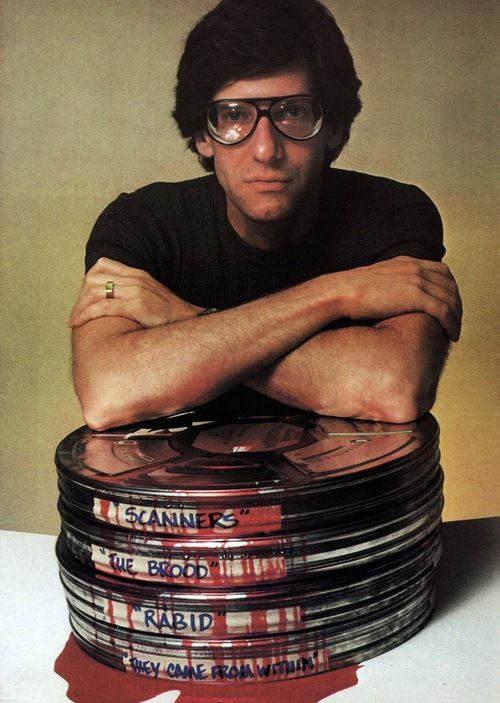
What was the thing that made you step across the line from Cronenberg fan to Cronenberg writer?
Opportunity was the thing that made me step across the line. I’ve already written a book called Monster Movies that touches on, approximately, 80 films. Coincidentally, THE FLY was the first film I wrote about for that book, although that has no direct bearing on this project.
There is a solid handful of films on which I’d be willing to dedicate the time and effort – and find the requisite number of words – to write a book. And THE FLY is one of those films. I’d just happened to have presented an introduction to a screening of THE FLY for a film society here in Melbourne called Cinemaniacs when I entered into negotiations with my publisher (Auteur Publishing, UK) about writing a monograph on a movie. Both THE FLY and THE BROOD were on my list of titles, and my publisher/editor, John Atkinson, jumped on the opportunity to add a David Cronenberg film to his Devil’s Advocates horror series. We talked a little about what that film should be – THE BROOD or THE FLY? But, considering I’d already started research on THE FLY and it’s kinda the bigger film with a potentially larger readership, that seemed like the way to go.
Why choose working with a publisher instead of self-publishing?
There’s something about being endorsed by a third party that is far more motivating than self-publishing. To have someone say ‘Yes, I like what you do and I think you are good enough to write a book for me’, is a wonderful thing. It not only means you’re contracted to someone, so you actually have a reason to get the book written, you also know that you have a team behind you to provide the marketing might once the book has been published. My book is part of the Devil’s Advocates series so it has the reputation of all that has been published in the series before it to get it out there and get sold. It’s very difficult to produce a book in isolation.
What are some of the topics you’ll cover in your book on THE FLY?
As I’ve already mentioned, it was way too difficult to just talk about THE FLY in isolation so I talk about where it comes from – in terms of the original short story, etc., but also how it harks back to classic forms of literature and storytelling the likes of Frankenstein, Beauty and the Beast, and Kafka (which is a correlation Cronenberg has drawn himself in that Paris Review article I mentioned).
I’ve broken the book into chapters starting with Cronenberg and how his own philosophies inform the film (THE FLY is all about fusion, so it’s not out of the box to talk about it in terms of being a fusion/synthesis with its director – Cronenberg even admits to being at his best physically when shooting THE FLY because he would workout in the breaks, just like Jeff Goldblum – another fusion of sorts between a filmmaker and his actors).
After setting up that argument, I then dig into the broader history of THE FLY and where the original concept came from, and how it reflects the experiences of its authors and a general post-war paranoia and distrust of science. Then I talk about how the Cronenberg remake came into being, and set the scene in a ‘making of’ context. Then I break down the film scene-by-scene, and then I talk about its release, impact, lineage, etc. That’s how it’s all come together but it’s possible the order and information may change in the editing process but I’m sure you get the gist.
Who was your first interview and how did that come about?
It was John Getz, who played the role of Stathis Borans, and I contacted him through his agent. Such a generous and lovely man. He had great memories of THE FLY and he was more than willing to share them – even if, in his words, they were a little hazy after so many years. That’s the thing about writing about an old movie – memories start to fade, even if they’re good memories, and also, people pass away. That’s why I’m trying to write my book through my eyes, peppered with the experiences of others, so hopefully, the text is as fresh and relevant as if it was written 30 years ago.
What has been the most surprising, positively and negatively, in researching and writing your book?
The most surprising thing has been how big the topic of THE FLY actually is. I thought I could get away with just writing about the Cronenberg film but, really, it’s not a book about THE FLY unless you touch on the DNA and lineage of the project i.e. the short story by George Langelaan and then the original THE FLY movie from 1958 by Kurt Neumann. Considering the concept is all about symbiosis, fusion and scientific evolution, I really needed to speak about these themes in terms of the greater context of THE FLY – like how much of its DNA comes from the nuclear hysteria of the 1950s and 1960s and the experiences of its original authors, and how much of it is Cronenberg? THE FLY, as a remake, is much bigger than just one filmmaker.
There is not a lot of negativity surrounding David Cronenberg’s THE FLY, although it required a colossal effort to get moving and was nearly aborted at a number of stages along the pipeline. Once the production got underway, despite the budgetary and time stresses, it appears the making of this film was a remarkably positive experience, and a very important one for many involved. It marked a juncture in David Cronenberg’s career where he would veer from horror and make more pointedly psychological projects.
Oh, another surprising thing was to find out that John Malkovich was the first choice for the role of Seth Brundle. Considering Jeff Goldblum is so fantastic in the role, it’s hard to imagine anyone else.
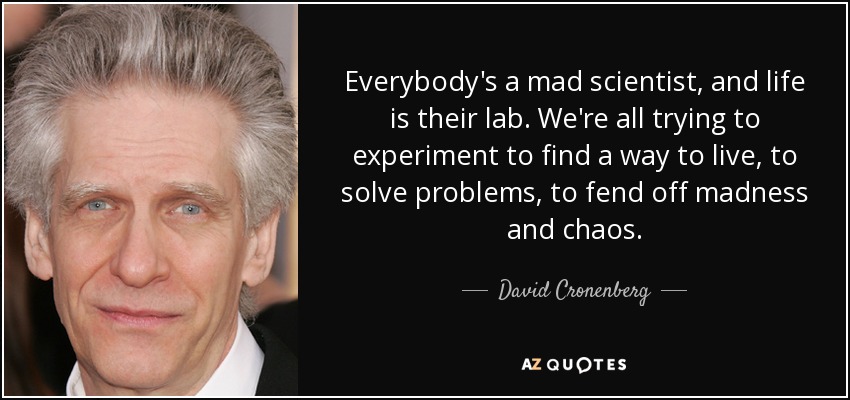
VIDEODROME vs. EXISTENZ: Which is the bigger mind fuck and why?
Can I actually nominate CRASH instead? I don’t think I’ve ever fully digested CRASH, and I didn’t particularly like it when I first saw it. So I’m planning on revisiting the experience very soon. I had a great conversation with THE FLY’s producer Stuart Cornfeld about CRASH where he basically agreed with me but said he revisited it recently and now thinks it’s a masterpiece. I’m hoping for the same experience. But that whole concept of people getting off on car crashes – it’s something the majority of people can’t understand, even on the smallest scale, so it’s something they’re more likely to laugh off. The whole thing is just one huge mind fuck.
Let’s not forget NAKED LUNCH too. William S. Burroughs AND David Cronenberg = cataclysmic mind fuck. I still don’t know what that film is really about and, interestingly, I don’t have to – it still works. I think Howard Shore’s score beautifully represents the insanity of it all.
It’s debate night and the world is watching you. Your opponent decides to ask this in hope of embarrassing you and winning the morality crusade: How can you justify the overt violence and sexuality in horror movies?
Overt violence and sexuality are life. Horror movies are the films that are brave enough to tackle the things we’re most likely to sweep under the rug. Just because we hide them does not mean they go away. It’s important to remember that, if a filmmaker shows brutality or some form of uncomfortable sexuality in their film, it does not mean they condone it. They are presenting adult subject matter to discerning adults. They are asking us to question the things around us, to open our eyes and, most importantly, to think. Some people don’t want to engage their brains when being entertained. I derive great pleasure and excitement from challenging cinema with challenging notions and smart concepts, and I’d like to think I’m a better person because of it.
Daily Grindhouse: What would you like to tell the readers?
If you love the film, read my book (due out mid-2017)! It’s written by a fan (me) so the idea is to make it accessible and enjoyable, rather than an academic treatise. I really hope the dialogue with others and my writing about THE FLY continues well after I finish this book. It is a film that poses so many questions and continues to live through other movies – old, new and yet to come. What I’m writing is a (long) love letter to just one film and, with a little bit of luck, others will be moved by my love story and will fall a little bit more in love with it too.
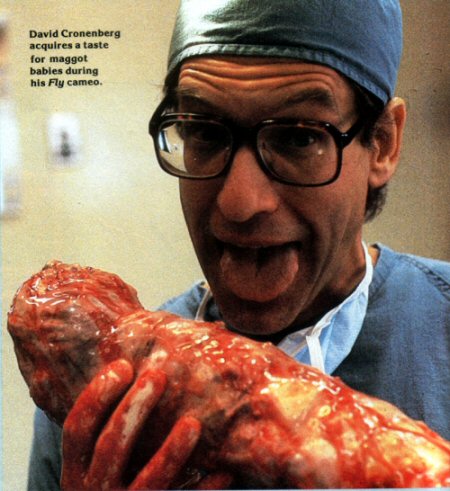
Tags: David Cronenberg, Emma Westwood, Geena Davis, Interviews, Jeff Goldblum, John Getz

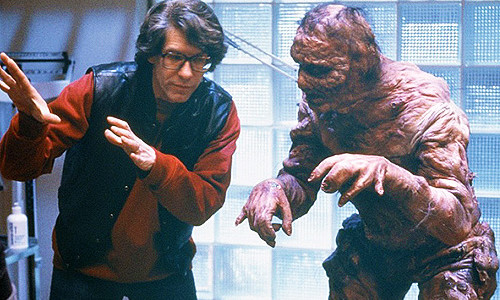
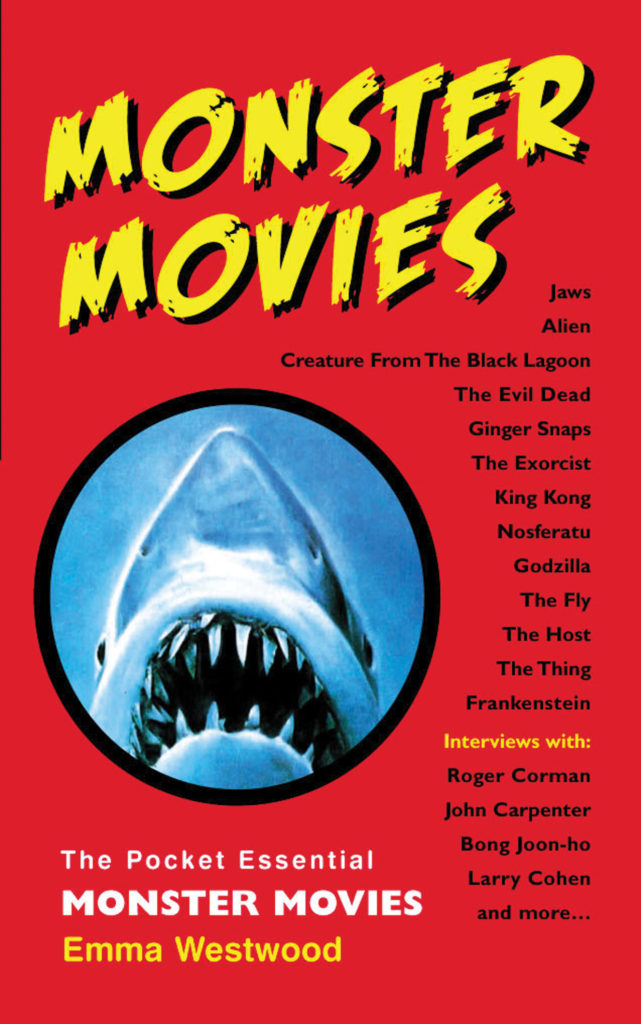
No Comments